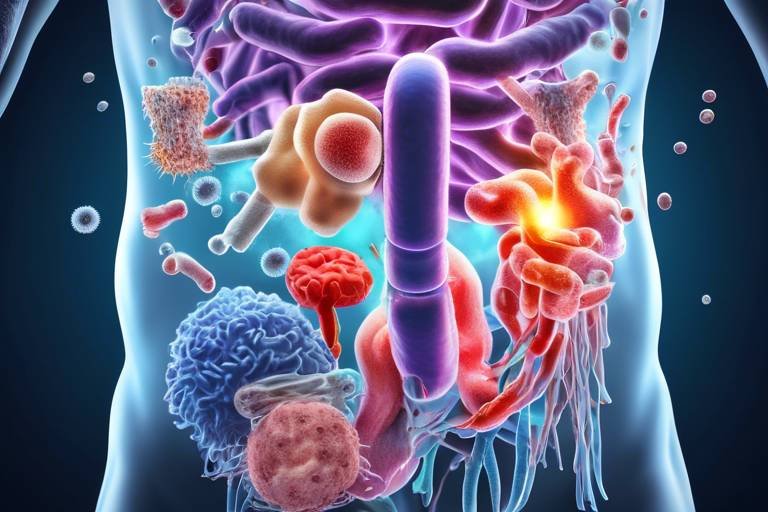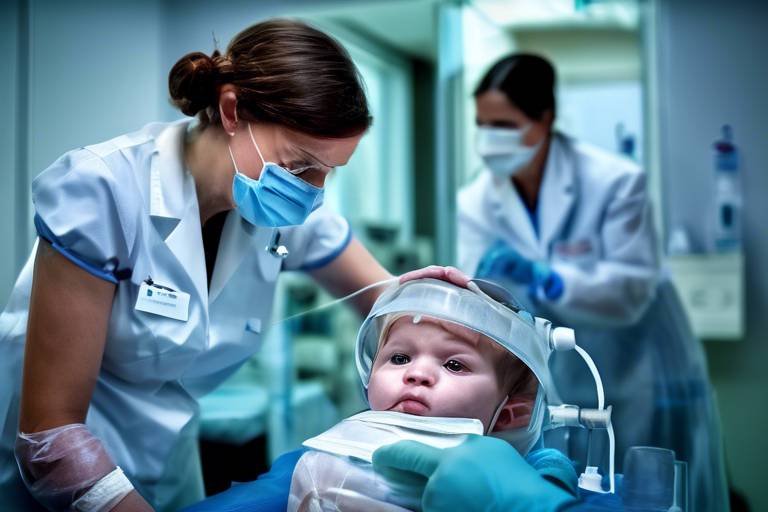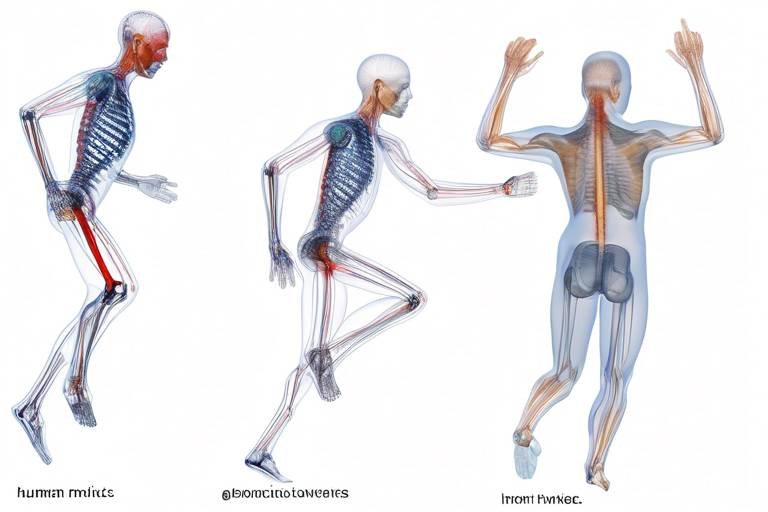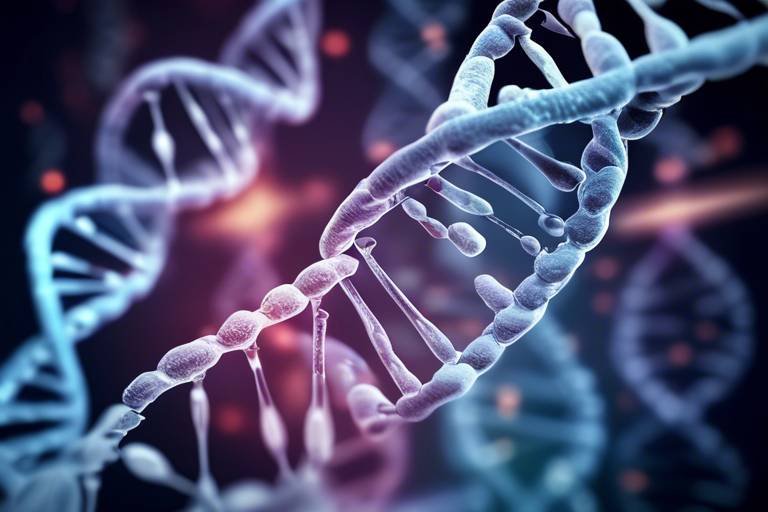The Role of Microbiomes in Human Health - Recent Findings
This article explores the significant impact of microbiomes on human health, detailing recent research findings, their implications, and potential applications in medicine and wellness. Microbiomes, those tiny ecosystems of microorganisms, are not just passengers in our bodies; they are active participants in our health journey. Imagine them as a bustling city, where each microbe plays a specific role, working together to keep the inhabitants (that's us!) thriving. In recent years, scientists have uncovered a treasure trove of information about these microbial communities and their far-reaching effects on our well-being.
Microbiomes are complex communities of microorganisms living in and on our bodies, primarily in the gut, skin, and mouth. These microscopic inhabitants include bacteria, viruses, fungi, and other microbes, each contributing to our health in unique ways. The composition and diversity of these communities can vary greatly from person to person, influenced by factors such as diet, environment, and lifestyle. Think of your microbiome as a unique fingerprint—no two are alike! This diversity is crucial; a rich variety of microbes can enhance our resilience to diseases and support overall health.
Recent studies highlight the crucial role microbiomes play in modulating the immune system. They act as a first line of defense, training our immune cells to distinguish between harmful invaders and friendly microbes. A balanced microbiome can enhance immune responses and protect against diseases, acting like a well-trained army ready to defend the body. When the microbiome is in harmony, it can help prevent infections and reduce inflammation. However, when this balance is disrupted, it can lead to a host of health issues.
The gut microbiome is particularly influential in shaping immune responses. It interacts with immune cells, influencing their behavior and helping to maintain a healthy immune system. For instance, certain gut bacteria produce short-chain fatty acids that have anti-inflammatory properties, promoting a balanced immune response. This interaction is a bit like a coach guiding a team; the right bacteria can help immune cells perform at their best, ready to tackle any challenges that come their way.
Dysbiosis, an imbalance in microbiome composition, has been linked to autoimmune diseases. When the microbiome is out of whack, it can trigger an overactive immune response, leading the body to attack its own tissues. Conditions such as rheumatoid arthritis, lupus, and multiple sclerosis have shown connections to dysbiosis. Understanding this relationship opens the door to new treatment strategies that could restore balance and improve health outcomes for those suffering from autoimmune disorders.
Probiotics are beneficial bacteria that can support immune health. These live microorganisms can help restore balance to the microbiome, especially after disruptions caused by antibiotics or illness. Recent findings suggest that probiotics can enhance immune function, making it easier for the body to fend off infections. Think of probiotics as the friendly neighbors who come to help when the community is in chaos—they can help restore order and promote health.
Emerging research suggests a strong link between microbiomes and mental health. The gut-brain axis is a fascinating area of study, where gut bacteria may influence mood, anxiety, and cognitive functions. For instance, certain gut microbes produce neurotransmitters like serotonin, which plays a key role in regulating mood. This connection is like a two-way street; just as our mental state can affect gut health, the health of our gut can influence our mental well-being.
Microbiomes are being studied for their role in disease prevention. Maintaining a healthy microbiome can reduce the risk of various diseases, including obesity and diabetes. Research indicates that individuals with a diverse microbiome are less likely to develop metabolic disorders. This is because a healthy microbiome can regulate metabolism and influence how our bodies process food. It’s like having a personal trainer for your metabolism, guiding you toward better health.
Diet significantly affects microbiome composition. Foods rich in fiber, such as fruits, vegetables, and whole grains, can promote the growth of beneficial bacteria. On the other hand, diets high in sugar and processed foods can lead to dysbiosis. A balanced diet is essential for maintaining a healthy microbiome, which in turn supports overall health. Consider your diet as the fuel for your microbiome; the better the fuel, the better the performance!
Ongoing research is uncovering new insights into microbiomes. Scientists are exploring innovative therapies that harness the power of microbiomes to treat various health conditions. From personalized probiotics to fecal microbiota transplantation, the future of microbiome research is bright. As we continue to learn more about these microbial communities, we may unlock new ways to enhance health and prevent disease.
- What is a microbiome? A microbiome is a community of microorganisms, including bacteria, viruses, and fungi, that live in and on our bodies.
- How do microbiomes affect health? Microbiomes play a crucial role in immune function, digestion, and even mental health, influencing our overall well-being.
- Can diet impact my microbiome? Yes, diet significantly affects the composition of your microbiome; a healthy diet can promote beneficial microbes.
- What are probiotics? Probiotics are live bacteria that can provide health benefits, particularly for gut health and immune function.
- How can I maintain a healthy microbiome? A balanced diet, regular exercise, and avoiding unnecessary antibiotics can help maintain a healthy microbiome.

[Understanding Microbiomes]
Microbiomes are like tiny ecosystems bustling with life, existing right within and on our bodies. Imagine a vibrant city where millions of microorganisms—bacteria, fungi, viruses, and even archaea—coexist, interact, and contribute to our overall health and well-being. These microorganisms are not just passive passengers; they play a crucial role in various bodily functions, influencing everything from digestion to immune responses. The composition of these microbiomes varies from person to person, shaped by factors such as genetics, diet, environment, and lifestyle choices.
To understand the complexity of microbiomes, we must first appreciate their diversity. In fact, the human microbiome is estimated to contain trillions of microorganisms, with thousands of different species. This intricate web of life can be categorized into different regions of the body, including:
- Gut Microbiome: The most studied microbiome, crucial for digestion and nutrient absorption.
- Skin Microbiome: Protects against pathogens and helps maintain skin health.
- Oral Microbiome: Plays a role in oral health and can impact overall health.
- Vaginal Microbiome: Important for reproductive health and preventing infections.
This diversity is not just fascinating; it’s vital. Each microorganism has its own unique function, contributing to the larger ecosystem. For example, certain gut bacteria are essential for breaking down complex carbohydrates, while others produce vitamins and short-chain fatty acids, which are beneficial for gut health. When these microbial communities are in balance, they help maintain homeostasis within the body. However, when there’s an imbalance, known as dysbiosis, it can lead to a plethora of health issues.
Research has shown that a healthy microbiome can enhance our immune system, regulate metabolism, and even influence our mood. This is why understanding microbiomes is not just a scientific curiosity; it’s a pathway to unlocking better health outcomes. As we continue to explore the vast world of microorganisms, we’re beginning to realize the profound impact they have on our daily lives.
In summary, microbiomes are intricate communities that play a fundamental role in our health. By nurturing these tiny allies through proper diet and lifestyle choices, we can pave the way for improved well-being and disease prevention. The journey into the world of microbiomes is just beginning, and the discoveries ahead are sure to be revolutionary.

[Microbiomes and Immune Function]
Recent studies have illuminated the fascinating and complex relationship between microbiomes and our immune system. These tiny communities of microorganisms, which include bacteria, viruses, fungi, and archaea, play a pivotal role in modulating our immune responses. Imagine your immune system as a finely tuned orchestra, where each instrument must play in harmony to create a beautiful symphony of health. In this analogy, microbiomes are the conductors, guiding the immune cells on when to act and when to relax. A balanced microbiome can enhance immune responses and protect against a myriad of diseases, while an imbalanced one can lead to chaos and dysfunction.
The gut microbiome, in particular, is a heavyweight champion when it comes to influencing our immune health. Research suggests that gut bacteria interact with immune cells in ways that help train and regulate our immune responses. For instance, certain beneficial bacteria produce short-chain fatty acids (SCFAs) during the fermentation of dietary fibers, which can promote the production of regulatory T cells. These cells are essential for maintaining immune tolerance and preventing excessive inflammatory responses. In simpler terms, a healthy gut microbiome can be your best defense against infections and autoimmune disorders.
As we dive deeper into the gut microbiome's role in immunity, it's essential to understand that this ecosystem is not just a passive player but an active participant in our health. When we consume food, the gut microbiome helps break it down, providing essential nutrients that fuel our immune system. Moreover, the gut is lined with immune cells that constantly interact with the microbiome. This interaction can be likened to a dance, where both partners must be in sync to achieve a harmonious outcome.
However, when there is a disruption in this delicate balance, known as dysbiosis, it can lead to a range of health issues. Dysbiosis can occur due to various factors, including poor diet, stress, and antibiotic use. The consequences can be dire, leading to conditions such as allergies, asthma, and even autoimmune diseases. Thus, maintaining a balanced gut microbiome is not just beneficial; it is crucial for our overall health.
Dysbiosis has been increasingly linked to autoimmune diseases, where the immune system mistakenly attacks the body's own tissues. This connection raises important questions about how we can prevent or manage these conditions through microbiome health. For instance, studies have shown that individuals with autoimmune diseases often exhibit a reduced diversity of gut bacteria. This lack of diversity can hinder the immune system's ability to differentiate between friend and foe, leading to unwanted attacks on healthy cells.
Addressing dysbiosis through dietary changes, probiotics, and prebiotics can potentially restore balance and mitigate the risk of autoimmune diseases. Imagine your gut as a garden; if certain plants (or bacteria) are overgrown while others are sparse, the overall ecosystem suffers. By nurturing a diverse range of beneficial bacteria, we can cultivate a healthier immune response.
Probiotics, often referred to as "good bacteria," have gained popularity for their ability to support immune health. These live microorganisms can be found in various fermented foods like yogurt, kefir, and sauerkraut. Recent findings suggest that regularly consuming probiotics can help restore balance to the microbiome, enhancing immune function and resilience against infections.
Research indicates that probiotics may help modulate the immune system by:
- Stimulating the production of antibodies
- Enhancing the activity of immune cells, such as macrophages and T lymphocytes
- Reducing inflammation in the gut
Incorporating probiotics into your diet can be a simple yet effective strategy to bolster your immune defenses. Think of them as the reinforcements your immune system needs to fend off invaders and maintain harmony within your body.

[Gut Microbiome and Immunity]
The gut microbiome is often referred to as the body's second brain, and for good reason. This intricate ecosystem of microorganisms, primarily bacteria, plays a pivotal role in shaping our immune responses. Imagine your gut as a bustling city where billions of tiny inhabitants work tirelessly to protect you from pathogens and diseases. The interplay between these gut bacteria and your immune cells is not just fascinating; it's essential for your overall health.
Research has shown that a **diverse and balanced gut microbiome** can enhance immune function, acting as a first line of defense against infections. When you consume food, it’s not just nutrients that enter your body; it’s also a variety of microbes that can either bolster or hinder your immune system. For instance, beneficial bacteria help educate immune cells, ensuring they can distinguish between harmless substances and harmful invaders. This educational process is crucial, as it prevents overreactions that can lead to allergies and autoimmune diseases.
However, when the gut microbiome becomes imbalanced—a condition known as dysbiosis—the consequences can be dire. Dysbiosis can lead to a weakened immune response, making the body more susceptible to infections and chronic diseases. It’s like having a poorly trained army that fails to recognize the enemy. This imbalance can be triggered by various factors, including poor diet, stress, and antibiotics, which can wipe out beneficial bacteria and allow harmful ones to flourish.
Interestingly, the gut microbiome doesn’t just influence your immune system; it communicates with it through various mechanisms. For example, gut bacteria produce short-chain fatty acids (SCFAs) during the fermentation of dietary fibers. These SCFAs not only provide energy to the cells lining the gut but also play a crucial role in regulating immune responses. They help maintain the integrity of the gut barrier, preventing harmful substances from entering the bloodstream, which could trigger inflammation and disease.
To illustrate the connection between gut health and immunity, consider the following table:
| Gut Microbiome Component | Role in Immunity |
|---|---|
| Beneficial Bacteria | Enhance immune response and protect against pathogens |
| Short-Chain Fatty Acids (SCFAs) | Regulate inflammation and strengthen gut barrier |
| Dysbiosis | Weakens immune defenses and increases disease risk |
Incorporating **probiotics**—live beneficial bacteria—into your diet can be a game-changer for gut health and immunity. Foods like yogurt, kefir, and fermented vegetables can help restore balance to the gut microbiome. Think of probiotics as reinforcements for your immune army, helping to fend off invaders and maintain peace within your body. Additionally, prebiotics—non-digestible fibers that feed good bacteria—are equally important. Foods rich in prebiotics include garlic, onions, and bananas, which nourish beneficial bacteria and promote their growth.
In conclusion, the gut microbiome is a critical player in our immune health. By nurturing this complex community of microorganisms through a balanced diet rich in probiotics and prebiotics, we can enhance our immune responses and protect ourselves from various diseases. The journey to better health starts in the gut, reminding us that we are, in many ways, what we eat.

[Dysbiosis and Autoimmune Diseases]
Dysbiosis refers to an imbalance in the microbial communities that inhabit our bodies, particularly in the gut. This imbalance can lead to a plethora of health issues, with autoimmune diseases being one of the most concerning. When the delicate ecosystem of our microbiome is disrupted, it can trigger inflammatory responses that may contribute to the development of autoimmune conditions. But how does this happen? Let's dive deeper into the relationship between dysbiosis and autoimmune diseases.
Research indicates that a healthy microbiome plays a critical role in regulating the immune system. It helps to train our immune cells, ensuring they can distinguish between harmful invaders and the body’s own tissues. However, when dysbiosis occurs, the immune system can become confused and may start attacking the body’s own cells, leading to autoimmune diseases. Conditions such as rheumatoid arthritis, lupus, and multiple sclerosis have been linked to microbial imbalances.
Several factors can contribute to dysbiosis, including:
- Poor Diet: High sugar and processed food intake can promote the growth of harmful bacteria.
- Antibiotic Use: Antibiotics can indiscriminately kill good bacteria along with bad ones.
- Stress: Chronic stress has been shown to negatively impact gut health.
- Lack of Sleep: Sleep disturbances can alter gut microbiota composition.
To illustrate the impact of dysbiosis on autoimmune diseases, consider the following table:
| Autoimmune Disease | Associated Dysbiosis |
|---|---|
| Rheumatoid Arthritis | Reduced diversity of gut bacteria |
| Multiple Sclerosis | Increased levels of pathogenic bacteria |
| Type 1 Diabetes | Altered gut microbiota composition |
By understanding the connection between dysbiosis and autoimmune diseases, researchers are exploring potential therapeutic interventions. Probiotics, for example, are being studied for their ability to restore a healthy microbiome balance. These beneficial bacteria can help to mitigate inflammation and enhance immune function, potentially reducing the risk of developing autoimmune conditions.
In conclusion, maintaining a healthy microbiome is essential for preventing dysbiosis and its associated autoimmune diseases. By focusing on a balanced diet, reducing stress, and being mindful of antibiotic use, we can support our microbiome and overall health.
Q1: What is dysbiosis?
A1: Dysbiosis is an imbalance in the microbial communities in our body, particularly in the gut, which can lead to health issues, including autoimmune diseases.
Q2: How can I prevent dysbiosis?
A2: You can prevent dysbiosis by maintaining a healthy diet, managing stress, getting adequate sleep, and being cautious with antibiotic use.
Q3: What role do probiotics play in gut health?
A3: Probiotics are beneficial bacteria that can help restore balance to the microbiome, potentially reducing inflammation and improving immune function.

[Probiotics and Immune Support]
Probiotics are often hailed as the superheroes of the gut, and for good reason! These live microorganisms, when consumed in adequate amounts, can offer a plethora of health benefits, particularly in supporting the immune system. Imagine your gut as a bustling city, where probiotics serve as the diligent police force, ensuring that everything runs smoothly and efficiently. They help maintain order in the microbial community, which is essential for a well-functioning immune response.
Recent studies have revealed fascinating insights into how probiotics interact with our immune system. For instance, they help stimulate the production of specific antibodies and promote the activity of immune cells such as T lymphocytes and macrophages. This interaction not only enhances our body's ability to fend off infections but also plays a crucial role in reducing inflammation. In fact, some research suggests that regular intake of probiotics can lead to a significant decrease in the incidence of respiratory infections, especially in children and the elderly.
Moreover, probiotics can help in restoring balance to the gut microbiome, particularly after disruptions caused by antibiotics or illness. When the gut flora is imbalanced, harmful bacteria can take over, leading to various health issues, including a weakened immune system. By introducing beneficial bacteria through probiotic supplementation or fermented foods, we can effectively rebalance our gut ecosystem. Foods rich in probiotics include yogurt, kefir, sauerkraut, and kombucha, which can be delicious additions to your diet.
It's essential to note that not all probiotics are created equal. Different strains offer different benefits, and ongoing research is helping us understand which strains are most effective for specific health conditions. For instance, strains like Lactobacillus rhamnosus and Bifidobacterium lactis have shown promise in enhancing immune responses. Therefore, when considering probiotics, it's wise to choose products that are backed by scientific research and tailored to your health needs.
In conclusion, incorporating probiotics into your daily routine can be a game-changer for your immune health. They not only bolster your body’s defenses but also promote overall well-being. As we continue to explore the intricate relationship between probiotics and our immune system, one thing remains clear: a healthy gut is essential for a healthy life!
- What are probiotics? Probiotics are live microorganisms, typically bacteria, that provide health benefits when consumed in adequate amounts.
- How do probiotics support the immune system? They enhance the production of antibodies, promote immune cell activity, and help maintain a balanced gut microbiome.
- Can I get probiotics from food? Yes, foods like yogurt, kefir, sauerkraut, and kombucha are rich in probiotics.
- Are all probiotics the same? No, different strains of probiotics offer different health benefits, so it's important to choose the right one for your needs.
- How often should I take probiotics? It's best to follow the instructions on the product label or consult a healthcare professional for personalized advice.

[Microbiomes and Mental Health]
The connection between microbiomes and mental health is an exciting frontier in medical research, and it’s gaining momentum faster than a roller coaster on its first drop! Imagine your gut as a bustling city filled with millions of microorganisms, each playing a unique role in your overall health. Recent studies suggest that this city does more than just aid digestion; it also communicates with your brain, influencing your mood, anxiety levels, and even cognitive function.
But how does this communication happen? Well, it all starts with the gut-brain axis, a complex network that links your gut and brain through biochemical signaling. The gut microbiome produces various metabolites, such as short-chain fatty acids, which can cross the blood-brain barrier. This means that what’s happening in your gut can directly affect your mental state. It’s like having a direct line to your brain’s call center, where every little change in your gut sends a message that can alter your mood or stress levels.
Research has shown that a healthy microbiome can lead to improved mental health outcomes. For instance, individuals with a diverse gut microbiome often report lower levels of anxiety and depression. Conversely, an imbalanced microbiome, known as dysbiosis, has been linked to increased feelings of anxiety and depression. Think of it this way: if your gut is out of whack, it’s like a disharmony in an orchestra, resulting in a cacophony of negative emotions.
Here are some fascinating findings from recent studies:
- Gut Bacteria and Mood Regulation: Certain strains of gut bacteria are believed to produce neurotransmitters like serotonin, which plays a crucial role in mood regulation.
- Impact of Probiotics: Probiotic supplementation has been shown to reduce symptoms of anxiety and depression in several clinical trials, suggesting that restoring balance in the gut can have profound effects on mental health.
- Dietary Influence: Diets rich in fiber and fermented foods can enhance microbiome diversity, subsequently promoting better mental health.
Moreover, the implications of these findings are vast. Imagine a world where mental health treatments incorporate microbiome modulation as a standard practice. This could mean using probiotics or dietary adjustments as part of therapy for anxiety and depression, potentially reducing the reliance on traditional medications that often come with side effects. It’s like finding a hidden treasure chest filled with natural solutions to some of our most pressing mental health challenges.
As we delve deeper into this relationship, it becomes increasingly clear that maintaining a healthy microbiome is not just about physical health but also about nurturing our mental well-being. So, the next time you think about your gut health, remember that it’s not just about digestion; it’s about feeling good mentally too. It’s a reminder that our bodies are interconnected systems, where every part, including our microbiome, plays a vital role in our overall health.
In conclusion, the link between microbiomes and mental health is more than just a scientific curiosity; it’s a pathway to understanding how we can better support our mental wellness through lifestyle choices and dietary habits. As research continues to unfold, we may soon unlock even more secrets about how these tiny organisms can have a big impact on our minds.
- What are microbiomes? Microbiomes are communities of microorganisms, including bacteria, viruses, and fungi, that live in and on our bodies, particularly in the gut.
- How do microbiomes affect mental health? Microbiomes can influence mental health through the gut-brain axis, affecting mood and anxiety levels via biochemical signaling.
- Can probiotics improve mental health? Yes, studies have shown that probiotics can help reduce symptoms of anxiety and depression by restoring balance to the gut microbiome.
- What dietary changes can support a healthy microbiome? Eating a diet rich in fiber, fermented foods, and a variety of fruits and vegetables can promote a healthy microbiome.

[Microbiomes in Disease Prevention]
Microbiomes are not just passive inhabitants of our bodies; they are active participants in our health and well-being. Recent research has illuminated the profound impact that these microscopic communities have on disease prevention. By understanding the intricate relationship between our microbiomes and various health conditions, we can take proactive steps to maintain a balanced microbiome, which in turn can significantly reduce the risk of numerous diseases.
One of the most compelling aspects of microbiomes is their role in **disease prevention**. A healthy microbiome acts as a barrier against pathogens, helps regulate inflammation, and plays a critical role in the metabolism of nutrients. When the microbiome is balanced, it can effectively fend off harmful bacteria, viruses, and fungi that can lead to illness. Conversely, an imbalanced microbiome, known as dysbiosis, can pave the way for chronic diseases such as obesity, diabetes, and even cardiovascular diseases.
Research has shown that a diverse microbiome is key to a robust immune system. For instance, studies suggest that individuals with a rich variety of gut bacteria are less likely to develop conditions like metabolic syndrome, which is characterized by obesity, high blood pressure, and insulin resistance. The diversity of our gut microbiome is influenced by various factors, including diet, lifestyle, and environmental exposures. Therefore, maintaining a varied and balanced diet rich in fiber, fermented foods, and probiotics can foster a healthy microbiome.
Moreover, the connection between microbiomes and diseases extends beyond just physical health. Emerging studies indicate that the gut microbiome may also influence mental health conditions, which can indirectly affect our overall health. For example, anxiety and depression have been linked to imbalances in gut bacteria, suggesting that a healthy microbiome could play a role in mental well-being and, consequently, disease prevention.
To illustrate the relationship between microbiomes and disease prevention, consider the following table that summarizes key findings from recent studies:
| Disease | Microbiome Influence | Preventive Measures |
|---|---|---|
| Obesity | Dysbiosis linked to increased fat storage | High-fiber diet, probiotics |
| Diabetes | Imbalance affects insulin sensitivity | Balanced diet, regular exercise |
| Cardiovascular Diseases | Gut bacteria influence cholesterol levels | Plant-based diet, fermented foods |
In conclusion, the evidence is mounting that a healthy microbiome is a cornerstone of disease prevention. By adopting lifestyle changes that promote microbiome health—such as improving dietary habits, managing stress, and avoiding unnecessary antibiotics—we can harness the power of these microbial communities to protect ourselves from various diseases. As research continues to evolve, it becomes increasingly clear that microbiomes are not just an interesting aspect of human biology; they are essential to our overall health and longevity.
- What is a microbiome? A microbiome is a community of microorganisms, including bacteria, viruses, fungi, and other microbes, that live in and on our bodies.
- How do microbiomes prevent disease? Microbiomes help maintain a balanced immune response, regulate inflammation, and protect against harmful pathogens.
- Can diet affect my microbiome? Yes, a diet rich in fiber, fermented foods, and probiotics can promote a healthy microbiome.
- What are probiotics? Probiotics are beneficial bacteria that can help restore balance to the microbiome and support overall health.

[Diet and Microbiome Health]
The relationship between diet and microbiome health is a fascinating yet complex one, akin to a dance where each partner influences the other's movements. Our gut microbiome, a bustling community of trillions of microorganisms, thrives on the foods we consume. Just as a gardener tends to their plants, the choices we make at the dinner table can either nourish or hinder these microscopic allies. Recent research has illuminated how different dietary patterns can significantly alter the composition and function of our microbiomes, ultimately impacting our health.
For instance, diets rich in fiber—found in fruits, vegetables, legumes, and whole grains—act as a feast for beneficial gut bacteria. These fibers are fermented by the microbiome, producing short-chain fatty acids that play a crucial role in maintaining gut health and supporting immune function. On the other hand, a diet high in saturated fats and sugars can lead to an imbalance known as dysbiosis, where harmful bacteria outnumber the good ones. This imbalance can contribute to a host of health issues, including obesity, diabetes, and even mental health disorders.
To illustrate the impact of diet on microbiome health, consider the following table that summarizes various dietary components and their effects on gut bacteria:
| Dietary Component | Effect on Microbiome |
|---|---|
| High Fiber | Promotes growth of beneficial bacteria; enhances gut barrier function |
| Processed Foods | Increases harmful bacteria; contributes to inflammation |
| Fermented Foods | Introduces probiotics; supports microbial diversity |
| High Sugar | Encourages growth of pathogenic bacteria; linked to obesity |
Incorporating a variety of fermented foods like yogurt, kefir, sauerkraut, and kimchi can also be beneficial for microbiome health. These foods are rich in probiotics, which help to replenish and maintain a balanced gut flora. Think of it as adding new, energetic dancers to a tired troupe, invigorating the entire performance. Furthermore, it’s essential to stay hydrated, as water plays a vital role in digestion and the overall health of our microbiome.
But it’s not just about what we eat; it’s also about how we eat. Mindful eating practices, such as taking the time to chew food thoroughly and savor each bite, can enhance digestion and promote a healthier microbiome. Stress, too, can wreak havoc on our gut health, so combining a nutritious diet with stress-reducing activities like yoga or meditation can create a harmonious balance.
In summary, maintaining a healthy microbiome through proper diet is not merely a trend; it’s a fundamental aspect of overall wellness. By making informed dietary choices, we can cultivate a thriving microbiome that supports our health and vitality. So next time you sit down for a meal, think about the impact your food choices have on your microscopic companions. Are you feeding them the nutrients they need to flourish, or are you inviting chaos into your gut?
- What are the best foods to support a healthy microbiome?
Foods rich in fiber, fermented foods, and a variety of fruits and vegetables are excellent for maintaining a healthy microbiome. - Can I restore my microbiome after it has been damaged?
Yes, by adopting a balanced diet rich in probiotics and fiber, you can help restore your microbiome's health over time. - How quickly can diet affect my microbiome?
Changes in diet can begin to affect your microbiome within days, but significant shifts may take weeks to months to stabilize.

[Future Directions in Microbiome Research]
The field of microbiome research is rapidly evolving, and the future holds exciting possibilities that could revolutionize our understanding of health and disease. As scientists delve deeper into the complex interactions between microorganisms and human biology, we are beginning to uncover the intricate ways in which these tiny organisms influence our health. One of the most promising directions is the development of personalized medicine based on microbiome profiles. Imagine a world where your doctor can analyze your unique microbiome composition to tailor treatments specifically for you, enhancing efficacy and minimizing side effects. This could be a game-changer in how we approach diseases, especially chronic conditions that have proven difficult to treat.
Moreover, researchers are exploring the potential of microbiome-based therapies, such as fecal microbiota transplantation (FMT) and targeted probiotics. These innovative treatments aim to restore a balanced microbiome, particularly in individuals suffering from dysbiosis-related conditions. For instance, FMT has shown remarkable success in treating recurrent Clostridium difficile infections, and ongoing studies are assessing its effectiveness in other diseases, including inflammatory bowel disease and even obesity.
In addition to therapeutic applications, the integration of advanced technologies such as metagenomics and artificial intelligence (AI) is set to propel microbiome research into new realms. Metagenomics allows scientists to analyze genetic material from entire microbial communities, providing insights into their functions and interactions. Coupled with AI, researchers can process vast amounts of data to identify patterns and correlations that were previously undetectable. This synergy could lead to breakthroughs in understanding how specific microbial profiles correlate with health outcomes.
Furthermore, the role of the microbiome in mental health is gaining traction. Studies are increasingly indicating that gut bacteria might influence neurotransmitter production and, consequently, mood and behavior. Future research may uncover novel therapeutic strategies targeting the gut-brain axis, potentially leading to innovative treatments for mental health disorders like depression and anxiety.
As we look ahead, it’s crucial to consider ethical implications and the need for regulatory frameworks surrounding microbiome research and therapies. Ensuring that these advancements are accessible and safe for the public will require collaboration between scientists, healthcare professionals, and policymakers. In conclusion, the future of microbiome research is bright and full of potential. As we continue to explore this fascinating frontier, we may unlock secrets that not only enhance our understanding of health but also pave the way for groundbreaking medical interventions.
- What is a microbiome?
A microbiome is a community of microorganisms, including bacteria, viruses, fungi, and other microbes, that live in and on our bodies. - How do microbiomes affect human health?
Microbiomes play a crucial role in digestion, immune function, and even mental health, influencing overall well-being. - What are probiotics?
Probiotics are live bacteria that can provide health benefits, particularly for gut health, by restoring balance to the microbiome. - Can diet influence microbiome health?
Yes, dietary choices significantly impact the composition and diversity of the microbiome, affecting health outcomes. - What are the future directions of microbiome research?
Future research may focus on personalized medicine, microbiome-based therapies, and the use of advanced technologies like AI to analyze microbiome data.
Frequently Asked Questions
- What are microbiomes and why are they important for human health?
Microbiomes are diverse communities of microorganisms, including bacteria, fungi, and viruses, that reside in and on our bodies. They play a crucial role in maintaining our health by aiding digestion, regulating the immune system, and even influencing our mood and cognitive functions. Essentially, they are like tiny allies that help keep our body balanced and functioning optimally.
- How do microbiomes affect our immune system?
Recent studies have shown that a balanced microbiome is essential for a robust immune response. Good bacteria in our gut interact with immune cells, helping to enhance our body's defenses against infections and diseases. Think of it as a well-trained army, where each bacterium plays a specific role in protecting the kingdom of your body!
- What is dysbiosis and how does it relate to autoimmune diseases?
Dysbiosis refers to an imbalance in the microbial communities in our body, which can lead to various health issues, including autoimmune diseases. When the good bacteria are outnumbered by harmful ones, it can trigger an inappropriate immune response, causing the body to attack its own tissues. It's like having a security system that mistakenly identifies friendly forces as intruders!
- Can probiotics help with immune support?
Absolutely! Probiotics are beneficial bacteria that can help restore balance to the microbiome. Recent research suggests that incorporating probiotics into your diet can enhance immune function and improve overall health. They act like reinforcements for your body's defense system, helping to fend off unwanted invaders.
- What is the connection between microbiomes and mental health?
Emerging research indicates a fascinating link between our gut microbiome and mental health. Gut bacteria can influence the production of neurotransmitters, which are chemicals that affect mood and cognition. This connection suggests that a healthy gut can lead to a happier mind, highlighting the importance of maintaining a balanced microbiome for overall well-being.
- How does diet influence microbiome health?
Your diet plays a significant role in shaping the composition of your microbiome. Foods rich in fiber, such as fruits, vegetables, and whole grains, can promote the growth of beneficial bacteria. On the other hand, a diet high in processed foods and sugars can lead to an unhealthy microbiome. It's like nurturing a garden; the right nutrients help your beneficial bacteria thrive!
- What are the future directions in microbiome research?
Ongoing research is uncovering exciting new insights into the role of microbiomes in health and disease. Future developments may include personalized microbiome therapies, targeted probiotics, and innovative dietary interventions aimed at optimizing microbiome health. The potential for breakthroughs in treating various conditions is immense, making this an exciting field to watch!



















